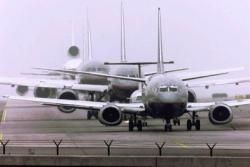Q3 2008 Results Are In, And They're Not Good
 The
six largest network airlines, as a group, reported an operating
loss margin of 5.8 percent in the third quarter of 2008, the fourth
consecutive quarterly loss margin since the group reported a profit
margin in the third quarter of 2007, the Bureau of Transportation
Statistics (BTS) of the US Department of Transportation reported
Monday in a release of preliminary data.
The
six largest network airlines, as a group, reported an operating
loss margin of 5.8 percent in the third quarter of 2008, the fourth
consecutive quarterly loss margin since the group reported a profit
margin in the third quarter of 2007, the Bureau of Transportation
Statistics (BTS) of the US Department of Transportation reported
Monday in a release of preliminary data.
BTS reported five of the six reporting network carriers, most of
the industry's largest carriers, reported an operating loss margin
in the July-to-September period Only Delta Air Lines reported an
operating profit. Operating margin measures profit or loss as a
percentage of the airline's total operating revenue.
Alaska Airlines, a network airline and Allegiant Airlines, a
low-cost airline, requested confidentiality beginning with their
second quarter 2008 financial reports. Mesa Airlines requested
confidentiality for its third quarter 2008 financial report. The
numbers are being withheld pending a decision on their motions.
Low-cost carrier Spirit Airlines failed to file its third
quarter financial data with BTS. The failure to file was referred
to the Department's Office of General Counsel for review.
The six reporting network carriers spent 36.1 percent of their
operating expenses in the third quarter of 2008 on fuel, compared
to 13.6 percent five years earlier in the third quarter of 2003.
The six reporting network carriers spent 6.20 cents per available
seat-mile (ASM) for fuel in the third quarter of 2008, up from 1.47
cents per ASM in the third quarter of 2003. Regional airlines
Atlantic Southeast, Comair and American Eagle Airlines spent the
most for fuel per ASM while regional airlines ExpressJet Airlines
and SkyWest and low-cost airline Southwest Airlines spent the
least.
The total industry collected $349.8 million in excess baggage
fees in the third quarter of 2008, up from $178.2 million in the
second quarter and $122.4 million in the third quarter of 2007.
 The six reporting network carriers
posted a loss margin of 5.8 percent in the third quarter with a
combined operating loss of $1.692 billion. In the third quarter of
2007, the seven network carriers reported an operating profit
margin of 8.8 percent with a combined profit of $2.387
billion.
The six reporting network carriers
posted a loss margin of 5.8 percent in the third quarter with a
combined operating loss of $1.692 billion. In the third quarter of
2007, the seven network carriers reported an operating profit
margin of 8.8 percent with a combined profit of $2.387
billion.
The top three operating profit margins were reported by regional
carriers Comair, SkyWest Airlines and Atlantic Southeast Airlines.
Network carriers US Airways and United Airlines and low-cost
carrier AirTran Airways reported the worst operating loss
margins.
Network carriers operate a significant portion of their flights
using at least one hub where connections are made for flights on a
spoke system. Low-cost carriers are those that the industry
recognizes as operating under a low-cost business model, with lower
infrastructure costs and higher rates of productivity. Regional
carriers provide service from small cities, using primarily
regional jets to support the network carriers' hub and spoke
systems.
The selected groups consist of those airlines in each group with
the highest reported operating revenue in the most recent 12-month
period.
 ANN's Daily Aero-Term (11.29.25): Waypoint
ANN's Daily Aero-Term (11.29.25): Waypoint ANN's Daily Aero-Linx (11.29.25)
ANN's Daily Aero-Linx (11.29.25) NTSB Prelim: Jabiru USA Sport Aircraft LLC J230-SP
NTSB Prelim: Jabiru USA Sport Aircraft LLC J230-SP Classic Aero-TV: Crafting The Future of eVTOL Infrastructure
Classic Aero-TV: Crafting The Future of eVTOL Infrastructure Klyde Morris (11.28.25)
Klyde Morris (11.28.25)




